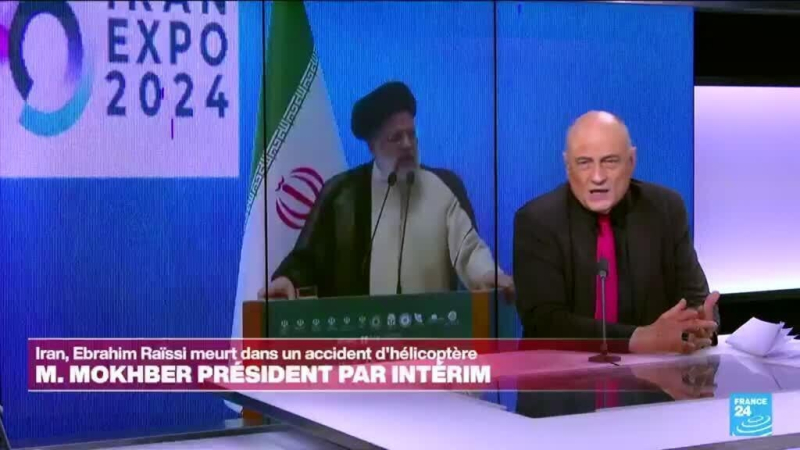Death of Iranian President Ebrahim Raïssi: new elections, Supreme Leader, uprising… what will happen now ?

On Sunday May 19, 2024, Ebrahim Raïssi died in a helicopter crash. If the President is not the figure with the most power in the country, his death could disrupt his political life. We explain to you what will happen in the coming weeks.
The President is dead, but there is no need to worry, assures Ayatollah Ali Khamenei. Ebrahim Raïssi was the victim of a helicopter accident on Sunday evening, with eight other people, including the Minister of Foreign Affairs, Hossein Amir-Abdollahian. it's going to happen.
Who decides in Iran ?
Iran is an Islamic republic. The person who holds the most power is not its President, elected by universal suffrage, but its Supreme Guide, appointed ; by "the Assembly of Experts". The eighty-six religious members of this chamber are elected every eight years by the people.
L’Ayatollah Khamenei
Since 1989, the Supreme Leader has been Ayatollah Khamenei. It supervises the executive, legislative and judicial powers. For the latter, it is notably à at the head of the Revolutionary Guards, with 150,000 soldiers. They are the ones who ensure the security of the site. interior.
The religious wins
On the side of legislative power, politics and religion clash once again – and the religious also wins. The Parliament is composed of: of 290 members, elected by direct universal suffrage. But each decision must be validated by another chamber, the Guardian Council, composed of: allies close to the Supreme Guide.
In summary, if the representatives of the executive and legislative powers are elected by the Iranian people, all their decisions must pass under the eye of religious figures in the country.
Vice President takes over
Article 131 of the Constitution provides that the vice-president, Mohammad Mokhber, takes over for 50 days, explains the specialist in international relations based in Toulouse Simon Berger, contacted by Midi Libre : "The first vice-president, subject to the agreement of the Guide – we are always brought back to the Supreme Guide who ultimately holds all the powers – will assume the powers and responsibilities of the President."
At the end of these 50 days of interim, presidential elections should be organized. "The problem is ;is that it potentially opens a political crisis, deplores Simon Berger. The election risks being marked by a very  ;low participation. The regime will make sure to prevent the candidacy of any moderate party. There could be significant electoral demobilization."
Because since 2022 and the death of Mahsa Amini, the country has been plagued by waves of protests, severely repressed by the Revolutionary Guards, controlled by the Supreme Guide.
The next Supreme Leader is dead ?
"The character is not just anyone, explains Simon Berger. The Iranian regime has two ruling heads. The Supreme Guide: he is really the head of state, and the Iranian president is a bit like super performer. He is there to carry out the general administration of the country."
"But Raïssi is a unique personality. Particularly, çit wasé one of the heads of the judicial system, he presided over an important foundation in the Muslim world." A major figure in the religious, political and economic life of the country. "He holds the ultra-conservative line. For example, he is one of the people responsible for the mass executions at home. the end of the Iran-Iraq war in 1988, notes the expert.
And in the coming years, Ebrahim Raïssi could have obtained even more power: "He é was seen as a potential candidate to replace the Supreme Guide in the event of his death. ; Find here our article on Ebrahim Raïssi.
Upcoming hectic elections ?
And the upcoming election will take place in a particular context, that of the detachment of the population from the political life of the country. Historian and political scientist, Jonathan Piron notes that candidates are rare: "We find ourselves with a particular situation: for the moment there is no big name that exists and could be considered as a legitimate candidate in the presidential election."
"The campaign will seem quite short, we could have an election that is not one. Where power remains in the hands of the ultra conservatives with a President once again poorly elected."
An insoluble crisis?
For Jonathan Piron, the crisis, already in place, will not necessarily worsen during the next elections. Because the death of Ebrahim Raïssi did not lead to national unrest, a need for uprising, or a feeling of injustice such as the assassination of Mahsa Amini’ nbsp;: "Here, since there was a very strong distrust of the population towards the power, we had scenes of joy, rather than scenes of anger."
But it is true that "Iran is still in a difficult economic and social situation. The inflation rate remains very high, finding a job is complicated, the daily life of Iranians is really very hard. The President was elected in 2021 saying that he would raise the socio-economic bar. But its results are totally negative."
Regional tensions
"What is important to note is that it’s not just the President who is dead. There is also the Minister of Foreign Affairs", underlines Simon Berger.
"We are in a tense period in the regional context. A month ago, we had tensions between Iran and Israel, against the backdrop of the Israel-Hamas war. This risks giving rise to a very tense situation regarding foreign policy in the weeks and months to come."
I subscribe to read more




